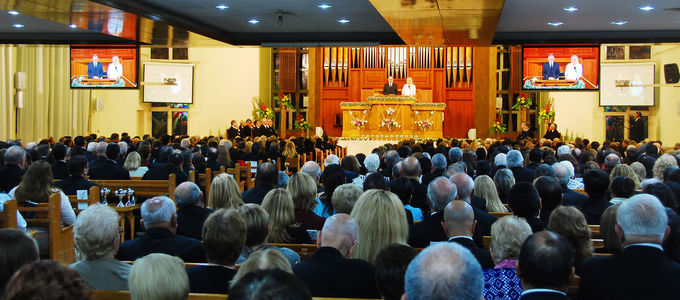God’s unprofitable servants—out of love for Christ
The Chief Apostle recently spoke about unprofitable servants in a divine service for ministers. Was he lecturing the ministers? By no means. He advised them on how they can put Christ in the centre of the congregation.

Nearly 10,500 ministers and their wives experienced a divine service by Chief Apostle Jean-Luc Schneider on Saturday, 2 April in Buenos Aires. It was transmitted to the rest of Argentina, as well as to Chile, Paraguay, and Uruguay. The sermon was based on Luke 17: 10: “So likewise you, when you have done all those things which you are commanded, say, ‘We are unprofitable servants. We have done what was our duty to do.’”
“You are probably thinking, what a strange Chief Apostle. First he says that he needs us and then he reads us a Bible text that tells us that we are useless,” is how the Chief Apostle began his sermon. “To be able to understand what Jesus meant we have to look at the whole story,” and read the entire passage, Luke 17: 7–10. His summary: “We have to tend Jesus’ flock and we have to plow the field.”
Property of Jesus Christ
“We are servants,” he said. That means that it is not our flock. “The flock belongs to Jesus Christ.” And the only one who can decide who belongs to the flock is Jesus Christ. “Not even the Chief Apostle knows who will be part of the bride of Christ.”
As servants we have to give account to Jesus. We have to account for every idle or useless word (Matthew 12: 36). “What are useless words?” the Chief Apostle asked. “The rules we sometimes invent,” and gave an example. “You know, in the past we had some funny things about haircuts and all kinds of other rules. That is not relevant for salvation.”
Providing, protecting, caring for
The first thing servants of God have to do is tend the flock. “We cannot produce the food that the people of God need.” We have to dig deep into the doctrine and examine ourselves to make sure that the spiritual food we are distributing is really of godly origin.
Tending the flock also means protecting it. The greatest danger for the faithful is that they do not love Jesus Christ enough and will therefore not be ready when He returns. The Chief Apostle went on to say, “You cannot do soul care standing behind the altar. To do soul care you have to be very close to those who are suffering.”
Preparing the future
Plowing the field is a further aspect and one of the tasks of a servant of God. “We have to make sure that the congregations, the children of God, can receive the godly seed.” For this we have to make sure there is a good atmosphere in the congregation and solve conflicts as quickly as possible, and with love and understanding.
We should not be discouraged that the harvest only comes so much later. On the contrary, we have to make provisions for the future. “We have to consider the needs of the next generation and the one after that. We cannot expect the youth to live as we did or to follow the rules we had to accept.”
Love is our only motivation
“When we are home our work is far from done. Also at home, in the circle of our families, we are servants of God,” the Chief Apostle said. “Are we a source of blessing for our own families? We have to practice what we preach.”
So why does Jesus speak about “useless servants”? “Our person, our ideas are not important. Let us preach about Jesus and put Him in the middle of the congregation.” The Chief Apostle went on, “Being useless servants also implies that we cannot earn our salvation by serving the Lord. We all need grace.”
“As servants of God we are not entitled to a special salary,” the Chief Apostle concluded. “Fellowship with God means we have everything. We cannot get more than the glory of God.” We have to get the idea out of our heads that we deserve more just because we are servants of God. After all, “what we do we do out of love for Jesus.”
Article info
Author:
Date:
Keywords:
Andreas Rother
02.06.2016
Argentina,
Chief Apostle,
Divine service




